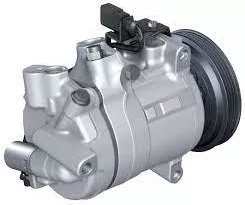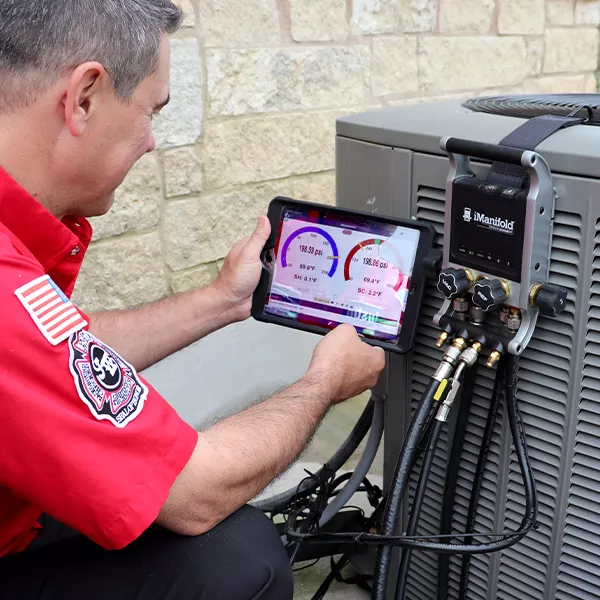What Is An AC Compressor?

The AC compressor, often referred to as the heart of your air conditioning system, is indispensable for maintaining a comfortable climate in your home. Essentially, the compressor circulates refrigerant necessary for heat exchange, playing a pivotal role in the cooling process.
In this article, we will demystify the AC compressor by covering:
- Why the compressor is the heart of your air conditioning system
- How an AC compressor works
- Common issues with AC compressors
- How to maintain your AC compressor
- Repair vs. replace: Making the right decision for your AC
Many homeowners wonder about the cost of replacing an AC compressor, which can be a significant investment, with prices sometimes exceeding $2,800. Understanding the compressor’s function and importance can help you make informed decisions about your air conditioning system.
Is your AC in need of a repair or just a routine check-up?
At Jon Wayne Service Company, we can help you keep your air conditioner running for years with reliable annual tune-ups and fast AC repairs. With 200 trucks on the road, we can get to your home quickly when you need help.
The Heart of Your Air Conditioning System
Most air conditioning systems have four main components: compressor, evaporator, condenser, and expansion valve. ACs also have fans that move air from one system to the next. The compressor is the heart of the system. It’s where the refrigerant gas is refreshed, allowing it to cool your indoor air all over again.
At its core, an AC compressor is a mechanical device that compresses refrigerant gas and transforms it from a low-pressure gas to a high-pressure state. This compressed refrigerant then moves through the system, releasing heat outside and cooling the air inside your home.
How Does an AC Compressor Work?
The AC compressor is fundamental to your air conditioner’s operation, acting as the heart of the cooling cycle. Here’s how it works:
Compression and Heat Transfer: As the refrigerant leaves the air conditioner’s evaporator, it is in a low-pressure gas state. The compressor’s job is to increase the refrigerant’s pressure and temperature. It compresses the low-pressure gas into a high-pressure gas, which enables it to release the absorbed heat more effectively. This high-temperature refrigerant transfers heat to the cooler outdoor air through the condenser, completing the heat exchange process.
Types of AC Compressors
There are three main types of compressors used in today’s residential air conditioning systems, each suited to different needs:
- Scroll Compressors: Known for their efficiency and quiet operation, scroll compressors use two spiral-shaped scrolls; one remains stationary, and the other orbits around it, compressing the refrigerant. These are widely used in residential air conditioning systems, heat pumps, and some small commercial units due to their ability to handle varying load conditions effectively.
- Reciprocating Compressors: These compressors function similarly to a car engine. A piston moves up and down inside a cylinder, compressing the refrigerant. Due to their reliability, they are common in residential and commercial air conditioning systems, refrigeration units, and heat pumps.
- Rotary Compressors: Compact and efficient, rotary compressors feature a rotor with attached vanes that rotate within a housing to compress the refrigerant. Their small size makes them ideal for window air conditioners, ductless mini-split systems, and commercial applications where space is at a premium.
Each type of compressor has unique advantages, making them suited to different applications within both residential and commercial settings. Understanding these differences can help you make informed decisions about your air conditioning system, especially when it comes to repairs or upgrades.
Common Issues with AC Compressors
When your electric bill skyrockets and the temperature in your house follows — no matter what setting you have on the thermostat — it could mean your compressor is reaching the end. Some other malfunctions that could be related to the compressor include leaks, odd noises, reduced airflow, or tripped circuits.
The most common reason AC compressors fail is missed maintenance visits. Lack of regular maintenance can lead to dirt and debris buildup, causing the compressor to work harder and eventually fail. Refrigerant leaks are another big issue since they reduce the system’s cooling efficiency and put excessive strain on the compressor. Faulty wiring or capacitor problems can also contribute to compressor breakdowns. It’s crucial to address these issues promptly through routine maintenance and timely repairs to prevent costly compressor replacements.
Maintaining Your AC Compressor

Be sure to change air filters regularly, even between maintenance visits. Clogged air filters are one of the biggest risk factors for adding dirt and debris to your compressor. However, the best way to keep your compressor in good condition is through annual professional tune-ups. At Jon Wayne Service Company, our tune-ups help your compressor last for years without sacrificing efficiency. We also help you avoid major repairs by catching problems early.
Repair or Replace? Making the Right Decision for Your AC
When your AC compressor stops working properly, it often means it’s time to replace the entire unit. After all, the compressor is one of the most expensive parts to replace at $2,800 or more. If your unit is still under warranty, then replacement is a solid option, but if not, you might want to upgrade with a newer unit. Newer AC units are more energy efficient and can help you save in the long run. A good rule of thumb is that if your AC unit is out of warranty and needs a repair that will cost around half of what a new unit would cost, it’s generally better to get a new unit.
Ready to upgrade your AC unit?
At Jon Wayne Service Company, our NATE-certified technicians can often handle AC installation in one visit. We stand for integrity, honesty, and convenience, so we’re committed to getting the job done right and at the agreed-upon price.
